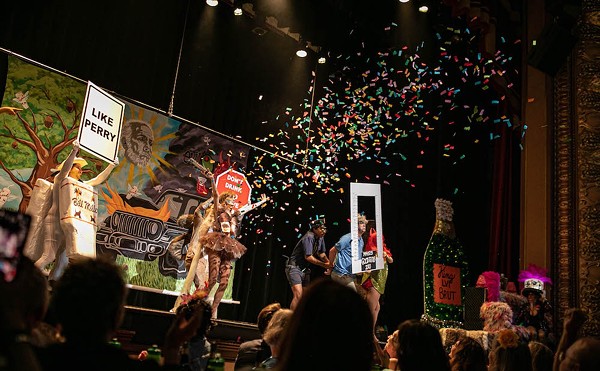Nahualliandoing Dos: An Anthology of Poetry in Nahuatl, Espanol and English / Edited by Anisa Onofre and Juan Tejeda / Atzlan Libre Press / $12, 52 pages
Who owns poetry? A medium that begins and ends, as cultural critic Michael Ventura has put it, in silence. No one can, but nations often claim poetry as theirs, from the Roman propaganda of Horace to the recent identity-based schmaltz offered up by the first ever immigrant/gay/Latino to be a U.S. Inaugural poet, Puerto Rican immigrant Richard Blanco. Poetry as a voice of the people is often and easily stolen into the state, for reasons that scared off Plato but soothed Robert Pinsky. But here is the thing: it's just as important to note that the dispossessed in any democracy (or whatever the hell it is we've got these days) can take poetry back. San Antonio's own Aztlan Libre Press, the premier underground chapbook makers of Chicano poetry, has put out a trident-tongued anthology of contemporary Latino poetry, mixing and milking words from English, Spanish, as well as Nahuatl, and in doing so has delivered in this book of 28 poems by 19 writers, from Francisco X. Alarcón to Michelle Zamora, a veritable alphabet of attitude, amour, and an authentic cry for identity.
We the Animals / By Justin Torres / Houghton Mifflin Harcourt / $18, 128 pages
For some kids, in much the same way it used to be depicted in any Sal Mineo tough guy noir like, say, Crime in The Streets, juvenile delinquency is linked to the most mature actions one might take towards self-preservation. The lonely brothers in 33-year old Justin Torres's slim debut novel We The Animals are the opposite of suburban latch key kids. Alone after school, avoiding the tyranny of their father and missing the protection of a mother who works from dusk till dawn at a brewery, they escape into the night to fend for food, find fights, and stave off — like James M. Barrie's lost boys — the world of encroaching manhood, which they fear will lead to a world of hardness, further abuse, and ultimate failure. Torres (who employs the royal "we" for his own band of boy kings) sheds light on the clannish mentality of street youth's method of survival, a mind set that leads to utter loyalty, diversion, and quick opportunity. But the camaraderie that insures survival on the streets prevents these kids from joining a bigger gang — the assimilation into mainstream culture necessary for American success.
















